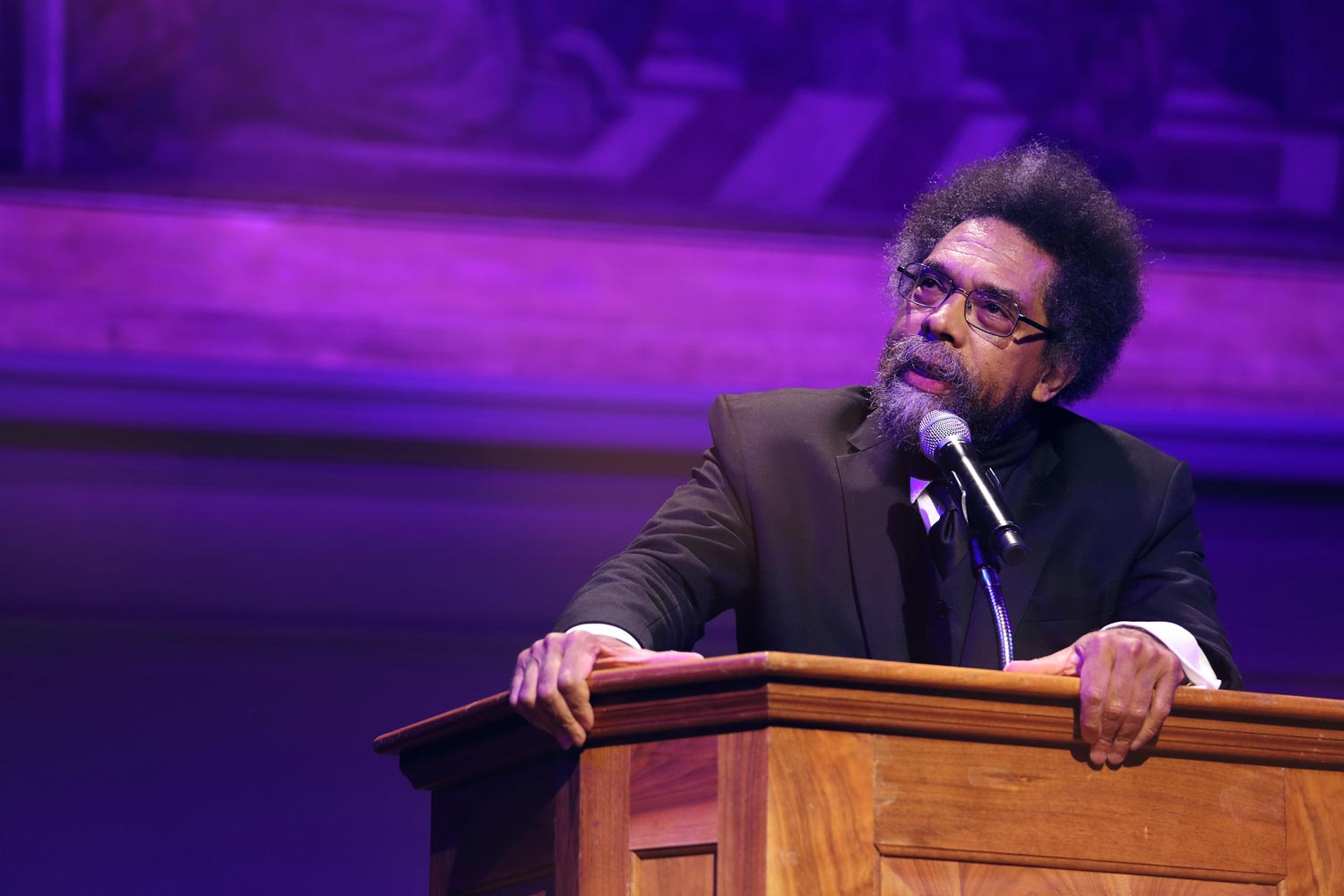Cornel West delivered an impassioned speech Friday evening to a standing-room-only audience at the University of Virginia’s Old Cabell Hall, dealing with spiritual malaise, neo-fascism and the plight of the poor.
West, a provocative public intellectual, is professor of the practice of public philosophy at Harvard University. His appearance on Grounds was the opening event in the second annual Excellence Through Diversity Distinguished Learning Series, offered by UVA’s School of Engineering and Applied Science to enhance dialogue on Grounds about race and perspectives on diversity.
In his talk, which swung from the personal to the philosophical to the political, West debunked the notion of the “self-made person,” saying that people are molded and shaped by other people.
“Someone loved me and cared for me,” he said. “My highest honor is being the son of Clifton West. I am not overwhelmed by high visibility, because that can be gone. You need the courage and the vision to tell the truth in your own fallible way.”
West, who was raised in Sacramento, California, said he was a small part of a tradition of the Shiloh Baptist Church, led at the time by Pastor Willie P. Cook, who West said told the truth and understood how to get people to respect themselves.
He said people today are understandably experiencing a spiritual blackout. “How do you locate yourself with all the absurdity that is coming at us?” he said.
Regarding the violent demonstrations led by white supremacists and neo-Nazis on UVA’s Grounds and in Charlottesville in August, West – who is African-American – said he belongs to a people who have been chronically hated for 400 years. As a result, the appearance and behavior of those white supremacist groups didn’t surprise him. West said he does not like the term “alt-right,” and said that people should refer to neo-fascists as neo-fascists and Nazis as Nazis and the KKK as the KKK.
He said there have been patriarchal attacks on women; attempts to strip lesbian, gay, bisexual and transgender people of their humanity; and anti-Semitic attacks on Jews, but he said he was an “old-style Christian who believes we are all made in the image of God.”
“These are times to separate the sunshine soldiers from the all-season love warriors,” he said.
West praised the mother of Emmett Till, a 14-year-old lynched in Mississippi in 1955 who became an icon of the civil rights movement. West said she had refused to hate because she was going to pursue justice the rest of her life.
“That is the best of what it means to be human,” West said.
He said he wants students to understand that wanting to be the smartest person in the room is a hollow ambition. “[Adolph Hitler’s propaganda minister] Joseph Goebbels was smart,” West said. “He was also spiritually empty and morally vacuous. We are having an eclipse of generosity and integrity as we pursue being the richest and the smartest.”
West, citing English historian Edward Gibbon’s “The History of the Decline and Fall of the Roman Empire,” said that Rome overextended itself militarily. West described the level of U.S. military spending and the number of foreign military bases as “an imperial albatross” for the country, while there is not enough money domestically for education, new jobs and for the minimum wage.
He also criticized the concept of urban renewal, which he referred to as “poor-people removal” in which America’s poor are treated the same as Third World poor.
“We have widespread poverty in the richest nation in the world,” he said. “There is no serious talk about poverty – and this isn’t new, because there wasn’t any under (former President) Barack Obama, either.”
The country, he said, was suffering a “moment of bleakness” and he said he is not optimistic. “I’m a bluesman in the life of the mind,” he said. “I am an adult. I am not optimistic.”
West said that the young need the love of family and teachers and people who will tell them the truth, and that these people must lead by example.

“Young folks don’t want to hear a sermon,” he said. “They want to see one.”
West also asked people to consider the lives they are living.
“Catastrophe is inescapable, but the question is, Will you respond like love warriors?” he said. “This country is incomplete and unfinished. I am not going to forget my father or my grandmother. I am going down swinging.”
West opened by thanking Engineering Dean Craig Benson, and Dorothy Fontaine, dean of the School of Nursing – two of the sponsors of his talk. Other co-sponsors included Facilities Management, the Office of the Executive Vice President and Provost, the School of Law, the University Health System, the Curry School of Education and the Frank Batten School of Leadership and Public Policy.
West also singled out praise for John F. Gates, the Engineering School’s associate dean for diversity and inclusion, whose team organized the diversity series; English professor Deborah McDowell, also the director of the Carter G. Woodson Institute of African-American and African Studies; Mark Edmundson, a University Professor in the Department of English; religious studies professor emeritus James Childress; and the late philosophy professor, Richard Rorty.
“This place means so much to me,” West said. “It has a special place in my heart.”
Click here to read more about future events in the Excellence Through Diversity Distinguished Learning Series.
Media Contact
Article Information
September 11, 2017
/content/cornel-west-exhorts-people-tell-truth-their-own-fallible-way

